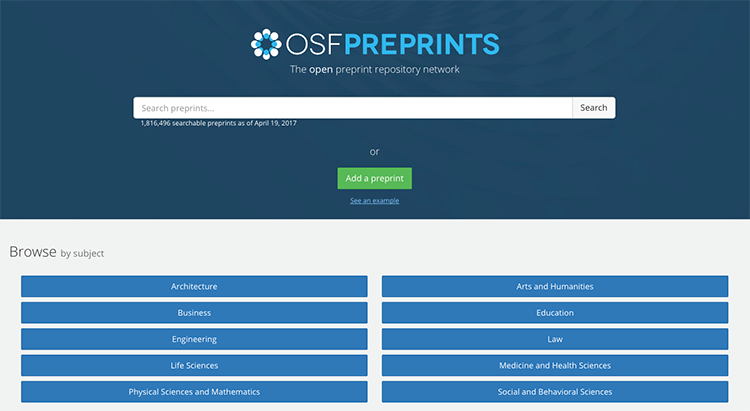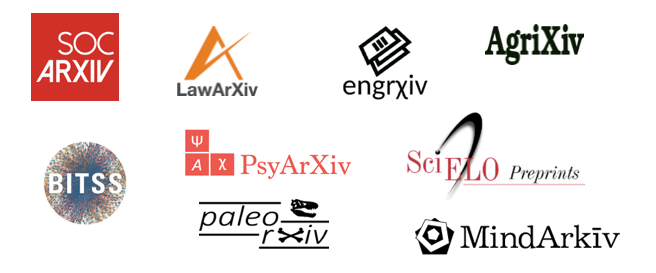
Judy Luther offered an insightful birds-eye view of the burgeoning preprints landscape at Scholarly Kitchen yesterday. As she mentioned, the Center for Open Science is contributing to preprints with a free, open infrastructure to support preprint services across scholarly communities. Here’s a brief summary of where we are, where we are heading, and what it all means.
OSF Preprints is an interface built on the Open Science Framework--a scholarly commons supporting the documentation, archiving, and sharing of data, materials, and outcomes of the research lifecycle. OSF Preprints has three defining features:
OSF Preprints is available as a general preprint service that accepts submissions from any domain of scholarship. However, the real power of the public infrastructure is in supporting branded services run by communities themselves. So far, five branded services are in production: SocArXiv for the social sciences, PsyArXiv for psychology, engrXiv for engineering, and the new AgriXiv for the agricultural sciences and BITSS for social sciences research methodology. Across these new services, more than 2,000 preprints are posted already and growth is accelerating.

In the coming weeks, more preprint services will be released with partners from other scholarly domains. The new partners include research funding organizations, research-focused non-profits, library consortia, and communities of researchers. Examples:
OSF Preprints is a new interface on the OSF. A public document for the requirements and roadmap facilitates comment and contribution from the community. The code is open-source at the COS GitHub repo for work in production and on the active development roadmap, and at COS Labs for work that is in research and development.
The next major release for OSF Preprints will be a moderation-review service layer. Preprint communities will define their own moderation and review standards. Some services may offer light-weight moderation standards like arXiv and bioRxiv do; others may offer more rigorous review similar to a journal. Some may offer pre-publication moderation and review only; others may offer post-publication commenting or review. Some may keep the moderation and review process private; others may experiment with different forms of transparency in the review process. The goal is flexibility to facilitate control and self-direction by service operators. As David Crotty’s “When is a Preprint Server Not a Preprint Server?” post in Scholarly Kitchen today makes clear, this will encourage direct engagement with terminology and foster concrete experimentation and re-evaluation of the entire scholarly communication pipeline.
OSF Preprints supports COS’s mission to increase openness, integrity, and reproducibility of scholarly research. A public good preprints infrastructure provides substantial benefits for the scholarly community:
OSF Preprints can support hundreds of groups in addition to the dozen early adopters. Broad adoption will foster a marketplace for innovation in scholarly communication practices. Effective models of publication and peer review will disseminate rapidly across scholarly communities.
We welcome developers of similar or related services to explore opportunities for complementary or co-development. We appreciate feedback and collaboration with scholarly communications experts to support the variety of use cases for preprints, peer review, and publication practices. And, of course, if you would like to launch a preprint service for your community, please be in touch!
6218 Georgia Avenue NW, Suite #1, Unit 3189
Washington, DC 20011
Email: contact@cos.io

Unless otherwise noted, this site is licensed under a Creative Commons Attribution 4.0 International (CC BY 4.0) License.
Responsible stewards of your support
COS has earned top recognition from Charity Navigator and Candid (formerly GuideStar) for our financial transparency and accountability to our mission. COS and the OSF were also awarded SOC2 accreditation in 2023 after an independent assessment of our security and procedures by the American Institute of CPAs (AICPA).
We invite all of our sponsors, partners, and members of the community to learn more about how our organization operates, our impact, our financial performance, and our nonprofit status.